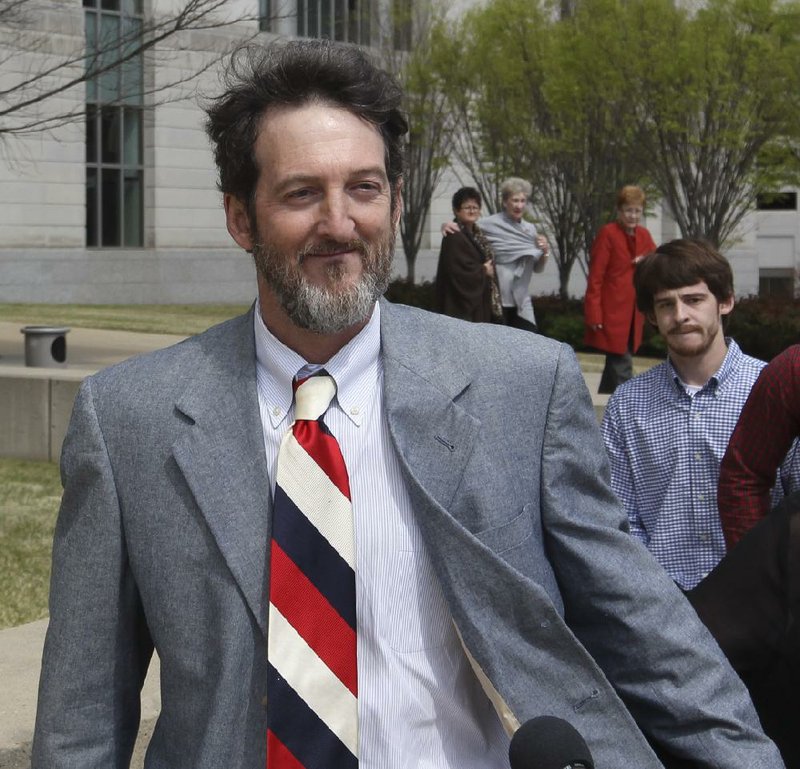More than a year after Michael Maggio was sentenced to prison for bribery, the ousted judge remains free during a lengthy appeal process.
The same federal judge who sentenced Maggio to 10 years in prison on March 10, 2016, later agreed to let him remain free pending an appeal to the 8th U.S. Circuit Court of Appeals in St. Louis. A three-judge appeals panel heard oral arguments March 8 and took the case under advisement.
But with hundreds of pending appeals, the court doesn't always move quickly.
"It's not surprising [for the court] to take 90 days" from oral arguments before ruling, Maggio's attorney, John Wesley Hall, said in an interview last week.
Maggio, who surrendered his law license, is unemployed. Hall is representing Maggio, who was declared a "pauper," as a court-appointed attorney.
During arguments before the appeals court panel, Hall acknowledged that "it's been a long time" since Maggio, 56, was sentenced.
"It sometimes takes a while to get these cases submitted on appeal," Hall said. "But it's no fault of former judge Maggio that it took that long to get here."
"He's not fleeing. He's not going anywhere. He's even here in the courtroom for the arguments. He's ready to submit to judgment if that's what happens, but he hopes to get a trial," Hall said.
Should the judicial panel uphold Maggio's conviction, which resulted from his guilty plea in January 2015, justices could order Maggio imprisoned under federal law, or they could let U.S. District Judge Brian Miller in Little Rock make that call.
Assistant U.S. Attorney Julie Peters alluded to that in her arguments before the panel after a judge asked if her office -- by not filing a timely appeal -- had waived its objection to Miller's decision to let Maggio remain free.
"For the United States to appeal, we are required to have the approval of the solicitor general, even on a bond issue. We were not able to obtain that," Peters replied.
In an email last week, Assistant U.S. Attorney Chris Givens explained: "We sought, but did not get that approval, and it was NOT because we didn't ask in time. I cannot get into reasons why the [solicitor general] did not give us approval, but it was not because of untimeliness."
Peters told the judges that, while she could not now ask them to revoke Maggio's bond, "Certainly, the court can act of its own accord."
She said it was "extraordinarily unusual" for Maggio to be free.
"In this case because the defendant was a judge, there's already this view that ... somehow he's getting a privilege because of his stature," she told the panel.
Shortly before his sentencing, Maggio tried unsuccessfully to withdraw his guilty plea and quit cooperating with federal prosecutors in the bribery investigation. His plea agreement implicated two other people -- lobbyist Gilbert Baker of Conway and nursing-home owner Michael Morton of Fort Smith -- though not by name. Both men have denied wrongdoing, and neither is charged in the case.
In September, special Judge David Laser delayed a hearing on whether to dismiss a related lawsuit in Faulkner County Circuit Court against Baker and Morton after all parties agreed that it was best to wait and see how Maggio's appeal goes and whether Maggio later will agree to answer attorneys' questions. Laser said he realized an appeals court decision could be months away.
That lawsuit accuses Morton and Baker of conspiring to bribe Maggio in July 2013 to lower a jury's $5.2 million judgment against a nursing home Morton owned in Greenbrier in a previous negligence case resulting from resident Martha Bull's death in 2008. Two days after Morton sent tens of thousands of dollars to several political action committees that later donated to Maggio's judicial campaign at the time, Maggio lowered the verdict to $1 million.
"Obviously, right now, [Maggio] is unavailable" to testify, Thomas Buchanan, the attorney for Bull's family, said last week. Until Maggio's appeal is resolved, "He's not going to do anything but take the Fifth [Amendment]," which protects people from having to give self-incriminating testimony.
"Once he is convicted, and there aren't appeals left, then he could potentially be available," Buchanan said.
If Maggio loses his appeal and goes to prison, he could cooperate again with federal prosecutors in the criminal investigation if they agree.
It's unclear if Maggio will pursue his case beyond the appeals court panel if he loses there. He could seek a review by the full court, or he could ask the U.S. Supreme Court to consider the case.
But during oral arguments, Hall spoke of the incredible odds against getting the nation's highest court to consider such a case.
"Once the case is decided, if it is affirmed, it will go back to the district court [in Little Rock], and it will be final with a mandate and possibly even faster than that depending on what Judge Miller does," Hall told the panel.
In that case, "Whether or not there's anything to take up on a certiorari petition [to the Supreme Court] is another question," Hall said. "And a certiorari is hard enough to get as it is, since they're only taking 75 cases a year out of [8,000] or 9,000 that come up there. So there's less than a 1 percent chance" of getting the high court even to consider an appeal.
The Arkansas Supreme Court ordered Maggio removed from office in September 2014 over unrelated problems, including online posts he made about a wide range of topics, including women, divorce, bestiality and race.
State Desk on 04/02/2017

